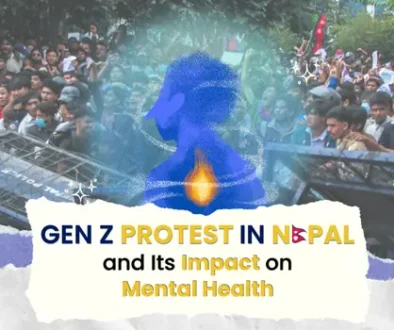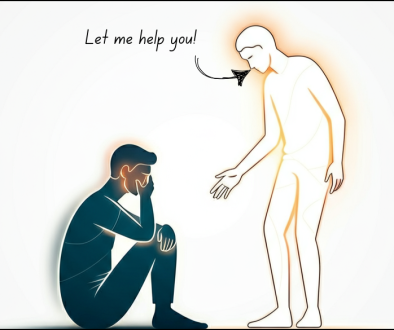How to support your friend?

Last updated on August 20th, 2021 at 06:57 am
Your friend just shared that they’re not doing great mentally. What should you do/say to show that you care?
Empathy is when someone is able to share or understand the feelings and emotions of another person even though they have never been exposed to such experiences.
Showing empathy is ingrained in human nature as well as in animals and is known to be evolutionary.
Thus, being empathetic towards a friend is natural to us. However, although we may be empaths at heart, it can be difficult for us to reflect on the emotion on the outside.
Especially when it comes to comforting or supporting a friend while they’re sharing their traumas, stressors, and distresses with us.
Sometimes, showing empathy or learning to say the “right” thing may be difficult for some of us. Here are a few ways you can be supportive to your friends suffering from depression, anxiety, trauma, etc.
First of all, you must try to understand what your friend is going through to be able to fully empathize with them. A few crucial steps to help understand your friend’s current state of mind are as follows:

- When they begin to share, do not hesitate to ask questions to get more information instead of assuming their struggles and jumping to conclusions without hearing their story.
Asking questions will help you fully understand the scope of their mental issues and thus determine how you will be able to help them.- Asking questions will make sure they know that you are interested in helping them and that you genuinely care.
- Sometimes, your friend may not feel like talking the first time you ask, so telling/showing them you care can be of much help.
- Keep asking open questions but make sure you aren’t being pushy.
Express your concern, remind them you’re there for them and try to have conversations in person whenever possible.
- As you are listening to them and asking questions, remember to validate their feelings. For instance, make sure they realize that they are being heard by saying things such as, “That sounds really difficult. I’m sorry to hear that.” or “It sounds like you are going through a difficult time right now. I am so sorry.”
- Knowing that they are being heard will make them feel validated, which will not only prompt them to open up but will make them feel more safe and comfortable with you.
- Show empathy and interest with your body language and be a good listener when on the phone. Allow them to complete their sentences and finish talking before you respond. Do not make them feel rushed!
- Using body language to make them feel heard can be leaning in when they are talking, nodding your head, and maintaining eye contact.
For when you are texting or are on the phone, allow them to finish talking before responding.
- Using body language to make them feel heard can be leaning in when they are talking, nodding your head, and maintaining eye contact.
Do not try to be a “fixer.”
An important element to remember is that being there for a friend does not mean giving them advice and dismissing their struggles with cold “solutions.”
You are there for support and to be a compassionate listener.
Thus, being there for them and giving them space to vent out and share their distresses is much more important than giving advice.
Oftentimes, simply talking face to face, or a phone call/text can be an enormous help to someone suffering from mental health issues.
Encourage the person to talk about their feelings, and give them a comfortable space to vent out by being willing to listen without judgment.
In other words, do not try to fix their problems or give them solutions.
Your friend is looking for comfort during their time of distress so give them a shoulder to lean on and a trustworthy listening ear.
If they are asking for more support from you, look for psychologists and psychiatrists or any mental health service that can be of help to them.
What to say and what not to say
It can be difficult to understand exactly what mental health issues feel like if you’ve never experienced them.
So, even if we have good intentions, we may say certain things and hope for someone else’s mental illnesses to get cured.
An important factor that will save you from saying the wrong thing to your friend while trying to show empathy is simply remembering that if you wouldn’t say something to someone with a physical condition such as cancer or diabetes, you shouldn’t say it to someone with a mental illness either.
Hence, saying things such as “Be grateful for the good things in your life” or “Just stop thinking about sad things” will do more harm than good while trying to comfort someone.
You can, however, encourage positivity by reminding them of their resilience, strength, and effort — especially when it seems like they only have negative things to say about themselves.
Positive support can let your friend know they do really matter to you while also helping them identify their strength.
For instance, after they are done sharing about their struggles with you, you may say something like “You are so brave to have gone through this,” or “You went through that and are staying resilient; your strength is truly inspiring.”
Make sure you are validating your friend’s emotions and are not dismissing their pain and distresses.
Say things like, “I can’t imagine how hard that is to deal with, I’m so sorry you’re going through this. I know I can’t make you feel better, but just remember you aren’t alone” or “What you are feeling is valid and you are a trooper for holding on for so long. I cannot take the pain away from you but I will be here for you while the pain passes by you.”
Additionally, here are some other things you CAN say:
- “You’re not alone. I’m here for you during this tough time.”
- “It may be hard to believe right now, but the way you’re feeling will change.”
- “Please tell me what I can do now to help you.”
- “Even if I’m not able to understand exactly how you feel, I care about you and want to help.”
- “You’re important to me. Your life is important to me.”
- “When you want to give up, tell yourself you will hold on for just one more day, hour, or minute—whatever you can manage.”
Source: helpguide.org
In contrast, try to avoid saying these to your friend:
- “This is all in your head”
- “Everyone goes through tough times.”
- “Try to look on the bright side.”
- “Why do you want to die when you have so much to live for?”
- “I can’t do anything about your situation.”
- “Just snap out of it.”
- “You should be feeling better by now.”
Source: helpguide.org
Lastly, do not neglect your emotional well-being while helping others.
It’s tempting to drop everything to be by your friend’s side and support them after hearing about their struggles with mental illnesses.
This can lead you to neglect your own needs which will leave you feeling burnt out or frustrated.
This emotional fatigue won’t allow you to give your undivided attention and affection to your friend, which won’t be helpful to them at all.
It’s extremely important to take care of yourself, especially while taking up the role of an empath.
Practice self-care and engage in activities you enjoy to recharge.


